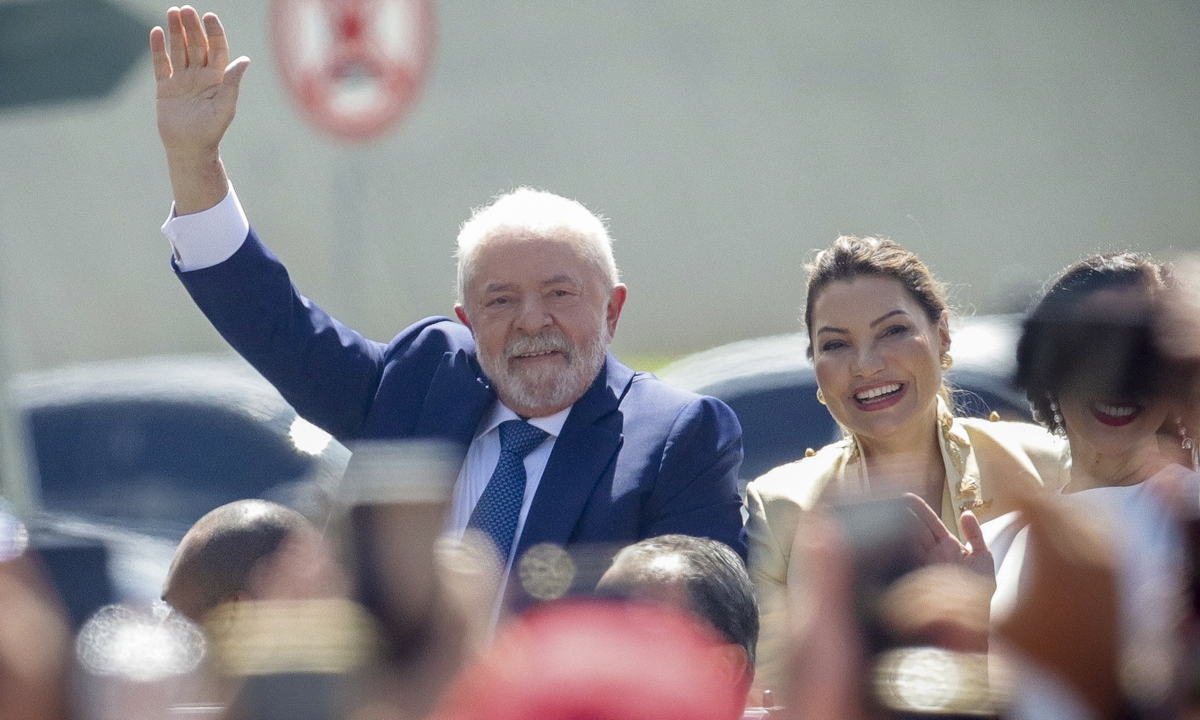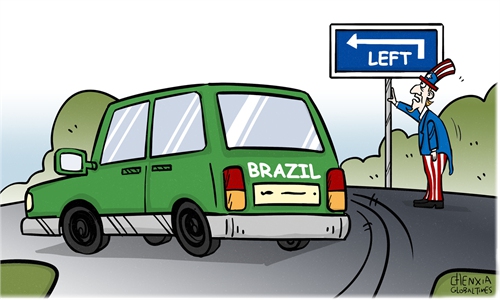Lula sworn in as president of Brazil, expected to bring ties with China to new heights

Luiz Inacio Lula da Silva waves after departing with his wife Rosangela Silva from the Metropolitan Cathedral to Congress for their swearing-in ceremony, in Brasilia, Brazil, January 1, 2023. Photo: VCG
Luiz Inacio Lula da Silva of the Workers' Party (PT) was sworn in as president of Brazil for a four-year term - the third time he has held the country's highest office - on Sunday, with a high-level Chinese delegation led by Chinese President Xi Jinping's special representative Vice President Wang Qishan attending the presidential inauguration.
The Chinese delegation led by the vice president shows that China attaches great importance to the comprehensive strategic partnership with Brazil, Chinese observers said, noting that under the "old friend" Lula's presidency, mutual political trust, comprehensive cooperation and overall relations between the two countries are expected to be brought to a higher level.
This is Lula's third presidential term and his return to power comes after having spent more than a year in prison between 2018 and 2019, due to a controversial sentence that was later annulled by the Supreme Court.
In October, Lula was elected president with 60.3 million votes, or 50.9 percent of the vote, while then President Jair Bolsonaro obtained 58.2 million votes or 49.1 percent. After the elections, the president-elect stressed in recent weeks that he will govern for everyone and that it is necessary to unite the country.
Lula's presidential inauguration attracted floods of his supporters gathering in front of Congress early in the morning - decked out in the red color of his Workers' Party. They traveled to see their leader sworn in - but also for a celebration, according to media reports.
The Chinese delegation led by Wang Qishan attended the presidential inauguration on Sunday at the invitation of the Brazilian government, according to the Chinese Foreign Ministry.
The Chinese vice president's trip speaks to the high importance China attaches to Brazil and bilateral relations, Wang Wenbin, spokesperson for the ministry said on Thursday. "We believe this visit will give a strong boost to our comprehensive strategic partnership and bring it to new heights, delivering more benefits for both countries and peoples and contributing to regional and global peace, stability and prosperity," the spokesperson said.
According to Reuters, Lula is expected to make official trips to China, the US and Argentina in his first three months in office, Foreign Relations Minister Mauro Vieira said in December 2022.
Wang Youming, director of the institute of developing countries at the China Institute of International Studies in Beijing, predicted that under China's old friend's presidency, economic and trade cooperation between China and Brazil will be further deepened, which will help ease Brazil's predicament of high inflation and low economic growth.
Mutual trust between China and Brazil on bilateral cooperation under the framework of the emerging-market bloc BRICS, as well as cooperation on economic and trade, environmental protection, the green economy and other fields is anticipated to be brought to a higher level, the observer said.
Chinese observers believe that China is expected to forge deeper ties with Latin America. Left-wing regimes in Latin America usually "pull away" from the US and advocate a diversified and balanced diplomacy, while right-wing regimes, although economically dependent on China, prefer to maintain close relations with North America, Europe and other countries in a more traditional way.
The veteran left-wing politician's presidency in Brazil, the largest country in Latin America, will lead a growing left-wing tide in Latin America toward a new peak, marking a fundamental change in the political landscape across the continent, observers believe.
In this context, the international environment of leftist countries such as Cuba and Venezuela will improve in the future, and the autonomy of Latin American diplomacy will be greatly enhanced. All these mean that it will be more difficult for the US to find a "fulcrum" for its "differentiation and disintegration" policy toward Latin America, they noted.
Wang Youming said Lula would pursue a moderate diplomatic line and adopt a strategy of balance between great powers.
Apart from diplomatic issues, the observer pointed out that the biggest challenge Lula faces is the current divisions in Brazilian society between left and right, and the prominent confrontation between different social camps.
On top of that, Lula will have to deal with political strife in Congress, where pushing through reforms in a right-wing-majority Congress will test the Lula administration's capabilities, Wang Youming added.
Brazil has created three "firsts" in its ties with China: the first developing country to establish strategic partnership with China; the first Latin American country to establish comprehensive strategic partnership with China; and the first Latin American country whose bilateral trade volume with China broke the $100 billion mark. Long-term friendship between China and Brazil, deepening mutually beneficial cooperation is in the fundamental interests of the two countries and two peoples, and is conducive to maintaining regional and global peace and stability, promoting common development and prosperity. We congratulate Lula on his election victory, and look forward to further development of China-Brazil friendship.



